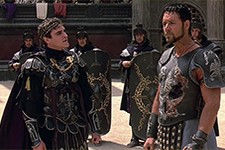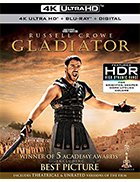Gladiator (4K UHD)
|  The release of Ridley Scott’s Gladiator in the summer of 2000 seemed to confirm that the recently created DreamWorks, after six years of theatrical releases, had settled on a unique strategy of using a summer tentpole release to revive a long-dormant Hollywood genre with a splashy, special-effects-laden modern spin. This strategy arguably began with the successful revival the World War II epic in Steven Spielberg’s Saving Private Ryan (1998), and the following year they tried (with considerably less success) to bring back the spectacle of the haunted house with Jan De Bont’s The Haunting (1999). Although we now know that it went on to be a massive box office hit and took home a sack of Oscars, the release of Gladiator, which was their most expensive film to date, represented the unimaginable: a $103-million attempt to resurrect the long-dead ancient Roman epic, a once steadfast Hollywood genre that has been defunct since the mid-1960s when big hits like Ben-Hur (1959) and Spartacus (1960) were eventually overshadowed by colossal financial failures like Cleopatra (1963) (not to mention 1980’s notorious big-budget hard-core epic Caligula). In returning that long-deserted terrain, Gladiator sought to be an old-fashioned sword-and-sandal tale amped up with graphic violence and a slick gloss of sentimentality. It almost worked. The story opens with the Romans battling the barbarian tribes in Germania around 180 A.D. Maximus (Russell Crowe), a Roman from the Spanish province (although he speaks with a British accent—go figure), is a highly venerated general who leads his armies to great victories (for the historical record, Rome never managed to defeat the Germans). He is so successful and loved that the dying Caesar, Marcus Aurelius (Richard Harris), asks him to accept power when he dies and give it back to the Senate so that Rome may become a republic again. Marcus Aurelius’s ambitious and cruel son, Commodus (Joaquin Phoenix), has other plans, and when the Caesar dies he executes Maximus’s family and attempts to have Maximus killed so that power will be maintained on the throne. Maximus escapes, but winds up in slavery where he is bought by an ex-gladiator-turned-profiteer named Proximus (Oliver Reed), who trains him to become a great gladiator. In ancient Rome, gladiators were heroes loved and followed by the crowds. Several times in the film, it is emphasized that Rome is not the Caesar or the Senate or even really the people: Rome is the mob. Whatever those bloodthirsty crowds of 50,000 in the Colosseum want, they get. “Win the crowd,” Proximus tells Maximus, which he does by becoming the best gladiator in the empire. When Commodus discovers that Maximus is still alive and well, he cannot have him killed because he is loved too much by the crowds. Even when he stacks the odds against Maximus—such as staging a fight against the only other undefeated Roman gladiator and putting a couple of hungry tigers in the ring as well—Maximus is still victorious and, in the process, becomes even more popular. Because of his immense popularity, Maximus is able to scheme a way to dethrone Commodus, an endeavor in which he is aided by Commodus’s sister, Lucilla (Connie Nielsen), with whom he was once romantically involved, and a Senator named Gracchus (Derek Jacobi). The story is much less confusing than it sounds on paper, but director Ridley Scott takes a full two and a half hours to tell it. The screenplay, which according to numerous reports was cobbled together in bits and pieces by screenwriters David Franzoni (Amistad), John Logan (Any Given Sunday), and William Nicholson (First Knight) while shooting was in progress, plays it fast and loose with the historical facts. Maximus is a purely fictional creation, although most of those with whom he shares the screen appear in historical record. A great deal of time and money was invested in recreating Rome in all its decadent splendor, and for the record, Gladiator is a dark, but visually astounding piece of work (Scott, ever the impressive visual stylist, was returning to the historical epic for the first time since his disastrous 1492: Conquest of Paradise in 1992). Using computer effects (some of which are better than others), the filmmakers attempt to recreate the spectacle of being in the Colosseum with tens of thousands of screaming Romans looking down. They include an overhead tracking shot that starts above the Roman streets and moves over the Colosseum, giving us a bird’s eye view of the scope and scale of the ancient world (it also makes an interesting connection to modern sports obsession, as the shot is quite reminiscent of the overhead blimp shots that are so common in NFL football games). While Gladiator suffers from an excess of almost sickening sentimentality and a jagged narrative that moves in an often lurching fashion, the film is perfectly cast. Russell Crowe, who won his first Oscar for the role, radiates both the power and intelligence necessary for Maximus, a character who is pure fantasy grounded just enough to be believable. Joaquin Phoenix is likewise perfectly suited for the role of Commodus, but for exactly the opposite reasons. Often shot with overhead lighting that darkens his deep eye sockets, thus giving him the appearance of a skull, Phoenix excels at being menacing in a completely despicable way. The filmmakers stack the deck against him, giving him the cliché effeminate qualities that always characterize cowardly Roman dictators, while also giving him hints of incestuous desire for his sister and even the suggestion of pedophilia. When Gladiator eventually fails, it is because it tries too hard. After all, this a film that was written during principle photography, so it is likely that the story is going to suffer. This didn’t stop Scott from trying to fashion a film that would out-emote Braveheart (1995), and it is here that the film grinds to a dead halt. Scott tries to milk every bit of sentimentality he can from Maximus’s slaughtered wife and child and his simple wish to “go home,” which becomes the fuel for his battle. This is tactical mistake in the story department, as the intrigue of political scheming and the bloody display of gladiatorial battle far outweigh familial sentiment, and it makes one impatient. Gladiator wants to move us emotionally, but it’s much better when it’s reveling in the mud and the blood.
Copyright © 2018 James Kendrick Thoughts? E-mail James Kendrick All images copyright © Paramount Home Entertainment | |||||||||||||||||||||||||||||||
Overall Rating: 

 (2.5)
(2.5)


